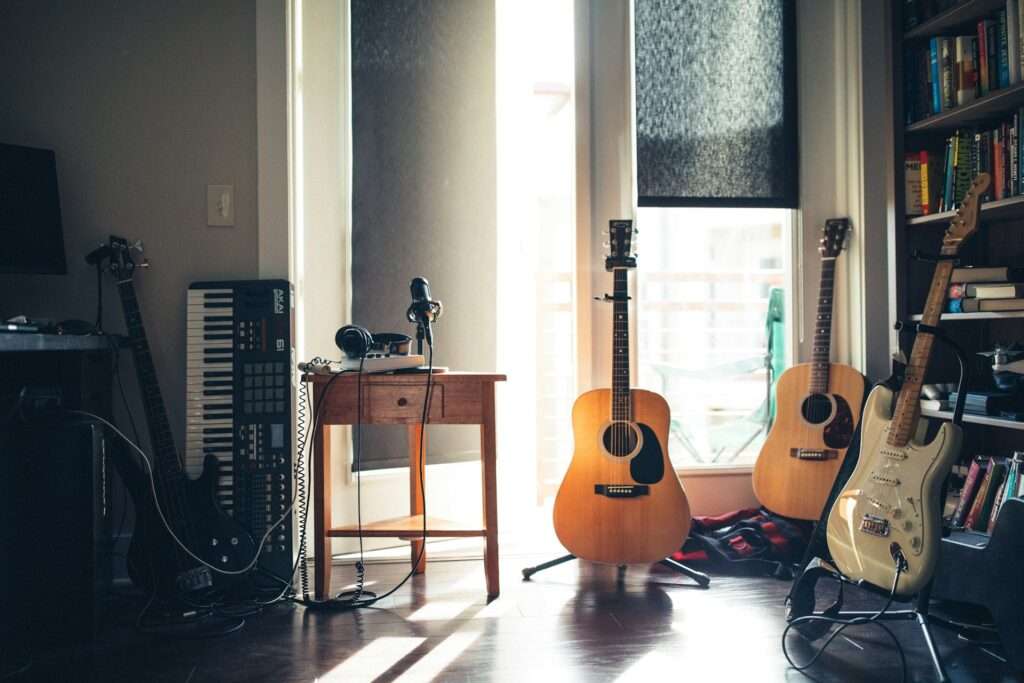For some musicians, playing instruments and writing songs is a vocational profession. You’re getting paid to express yourself and are rewarded for the time you dedicated to learning your scales and refining your style.
However, you may find that being a musician makes it hard to pursue other hobbies. After all, you’ll need to invest plenty of time into practicing your skills and may need to spend much of your free time networking in order to land gigs and high-paying clients.
Fortunately, the demanding nature of playing music professionally doesn’t mean you need to give up all your other hobbies — you just need to use your time wisely. Strategic changes, like scheduling your day in advance, can help you find more free time and juggle multiple hobbies while advancing your career in the music industry.
Music-Adjacent Hobbies
If you’re a full-time musician, you probably don’t want to spend all your free time practicing new riffs or writing lyrics for a new album. However, you may find that you still want to scratch that creative itch when you return home from work. Rather than kicking back on the couch and doom-scrolling the day away, consider starting some music-adjacent hobbies. Some of the best hobbies for musicians include:
- Fiction Writing: Writing a short story can help you understand your creative purpose and express yourself in a new medium. There’s no pressure for your output to be “good”, either, as you won’t need to present it on stage.
- Gardening: Gardening can be a powerful tonic after a busy day recording or performing music. Tending your garden gives you time to think and occupies your mind. You may even find that reconnecting with nature in this way helps you see the world in a new light.
- Learning a New Language: Learning to express yourself in a new language is a little like learning a new instrument. It may unlock some creative thoughts you didn’t know you had and could be the catalyst for a new direction in your musical career.
- Art: Painting, pottery, photography, and drawing are great ways to express yourself without having to worry about how well you perform. Learning to express yourself with abstract paintings or wildlife photography can help you see the world in a new light, too.
You can make the most out of these creative, relaxing pursuits by utilizing strategies to balance your hobbies more effectively. This includes changes like:
- Assess Priorities: Which hobbies and pastimes will bring you the most fulfillment in the long term? Prioritize these over other activities that may not bring you the same level of fulfillment.
- Say “No”: As a musician, you may have developed a habit of saying “yes” to every job that comes your way. While this is a good way to make your name, it will undermine your work-life balance. Try to carve out some time for yourself by setting some boundaries that work for you.
- Schedule: Scheduling your free time may sound like more trouble than it’s worth. However, creating a routine is an excellent way to ensure that you show up to your favorite activities and stick with them in the long term.
- Set Goals: A few tactful goals can give you the motivational boost you need when you’re feeling tired and are considering skipping a practice. A few realistic goals can give you a good reason to celebrate your success and share your passion with others.
Following these tips can help you make time for your pastimes and get more from your hobbies. They may help you enjoy playing music and boost your mental health, too. This can be really handy if you feel that a hobby like artwork or crafting informs your musical production and helps you brainstorm new ideas for the studio.
Earning Extra Income
In time, your hobbies may even turn into a side hustle. This can be deeply motivating if you’re planning to take some time away from the stage to explore more personal musical goals. For example, if you’re entering your golden years and aren’t enthusiastic about the idea of touring in later life, consider profitable hobbies for retirees like:
- Photography: If life in the limelight is no longer your thing, consider entering the musical photography scene. Your experience will help you take great photos and will ensure you’re still able to mingle with familiar faces.
- Growing Produce: If you decide that a slow-paced hobby is right for you, consider gardening and growing your own healthy produce. This can help you connect with the community and will take your mind away from the upcoming performances that may make you nervous.
- Cooking: Lots of musicians take up cooking during their careers. Snoop Dog has his own show with Martha Stewart, while Action Bronson travels the world cooking and enjoying international cuisine. You may find that your own recipes are good enough to turn your passion into a small-scale catering venture.
These side hustles may be the ideal way to fund your growing musical passion if you’re just entering the industry for the first time, too. Profitable pastimes like furniture restoration or crafting can be enriching and financially rewarding, meaning you may be able to generate enough extra income to pay for new instruments or marketing for your upcoming album.
Conclusion
Balancing your hobbies is crucial if you’re a musician with a passion for other vocational pursuits. Find time for your pottery and poetry by scheduling your day and setting boundaries with your work colleagues. If you’re struggling to find enough time in the day, consider shifting your work hours and playing music in the mornings to free up time for other passions in the evening.
By Indiana Lee

Yeah it can be difficult to balance all the competing demands on our time